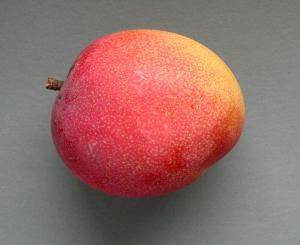Mango Fruit Prevents or Stops Certain Colon & Breast Cancers

That's according to a new study by Texas AgriLife Research food scientists, who examined the five varieties most common in the U.S.
The tropical mango is an ancient fruit heavily consumed in many parts of the world, known to have beneficial digestive health aspects. The National Mango Board commissioned a variety of studies with several U.S. researchers to help determine its nutritional value.
As a superfood providing valuable nutrients and enzymes as well as high antioxidant levels, Mango is beneficial to health, similar to blueberry, acai and pomegranate.
The research team checked mango against cancer cells anyway, and found it prevented or stopped cancer growth in certain breast and colon cells.
" If you look at it from the physiological and nutritional standpoint, taking everything together, it would be a high-ranking super food,"they noted. "It would be good to include mangoes as part of the regular diet."
The researchers tested mango polyphenol extracts in vitro on colon, breast, lung, leukemia and prostate cancers. Polyphenols are the natural substances in plants associated with a variety of compounds known to promote good health.
Mango showed some impact on lung, leukemia and prostate cancers but was most effective on the most common breast and colon cancers.
"What we found is that not all cell lines are sensitive to the same extent to an anticancer agent," they explained. "But the breast and colon cancer lines underwent apotosis, or programmed cell death. Additionally, we found that when we tested normal colon cells side by side with the colon cancer cells, that the mango polyphenolics did not harm the normal cells."
Further tests on the colon cancer lines were conducted because a mango contains both small molecules that are readily absorbed and larger molecules that would not be absorbed and thus remain present in a colon.
"We found the normal cells weren't killed, so mango is not expected to be damaging in the body," they also said. "That is a general observation for any natural agent, that they target cancer cells and leave the healthy cells alone, in reasonable concentrations at least."
They evaluated polyphenolics, and more specifically gallotannins as being the class of bioactive compounds (responsible for preventing or stopping cancer cells). Tannins are polyphenols that are often bitter or drying and found in such common foods as grape seed, wine and tea.
The study found that the cell cycle, which is the division cells go through, was interrupted. This is crucial information because it indicates a possible mechanism for how the cancer cells are prevented or stopped.
"For cells that may be on the verge of mutating or being damaged, mango polyphenolics prevent this kind of damage," they said.
According to the National Mango Board, based in Winter Park, Fla., most mangoes consumed in the U.S. are grown in Mexico, Ecuador, Peru, Brazil, Guatemala and Haiti. Mangoes are also native to south east Asia and India and are best produced in tropical climates. They were introduced to the United States in the late 1800s, and a few commercial acres still exist in California and Florida.

Comments
Post a Comment